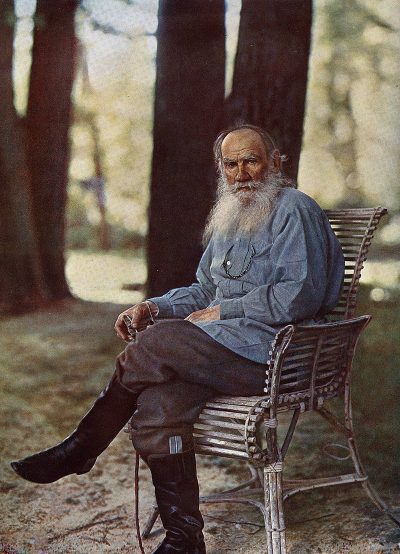Leo N. Tolstoy: “Speech Against War.” Call to the People: “You Shall Not Kill!”

All Global Research articles can be read in 51 languages by activating the “Translate Website” drop down menu on the top banner of our home page (Desktop version).
To receive Global Research’s Daily Newsletter (selected articles), click here.
Visit and follow us on Instagram, Twitter and Facebook. Feel free to repost and share widely Global Research articles.
***
First published on April 13, 2022.
In recent developments, Leo N. Tolstoy among numerous 19th century Russian authors and composers was casually put on the blacklist of the Kyiv regime.
Leo Tolstoy, actually Lev Nikolayevich Count Tolstoy (1828-1910), is still undisputedly considered one of the most important literary figures and intellectuals in the history of literature. His main works are the realistic novels “Anna Karenina” and “War and Peace”. With them he became known all over the world. Tolstoy also wrote books that criticised czarist Russia as well as reading books for schoolchildren.
As he was committed to reform pedagogy, his concern was to impart values to Russian farmer children. They should know how to behave in a socially and morally correct way. With these ideas, he was a pioneer in Russia, but received much recognition for his efforts, especially abroad.
Tolstoy was not an advocate of the dictatorship of the proletariat, he had other ideas. That is probably why the October Revolution of 1917, which took place after his death, was not to his liking. He believed that the established czarist functionaries should not be replaced by socialist ones, otherwise everything would remain the same.
Many of Tolstoy’s sayings are legendary. Among his best are certainly his statements about man, God, life, reason and love. He is reported to have said:
“The most important goal is the now, the most important person is the neighbour I am talking to now; the most important deed is to do good to the neighbour.” (1)
This is also followed by his “Speech against War” of 1909, in which he wrote:
“Beloved brothers! We have gathered here to fight against war. (…) Therefore, I would like to propose to our assembly that we write and publish an appeal to the people of all nations and especially of the Christian nations, in which we say clearly and straightforwardly what everyone knows, but what no one or almost no one says: Namely, that war is not, as men now pretend, some particularly valiant and praiseworthy thing, but that it is, like all murder, a detestable and sacrilegious act, not only for those who choose the military career of their own free will, but also for all those who devote themselves to it for fear of punishment or for the sake of selfish interests.” (2)
A little later he continues with the following words:
“We must say what everyone knows and just does not dare to say, we must say that no matter how much people change the name they give to murder, murder always remains just murder – a sacrilegious, disgraceful act. And one need only say this clearly, firmly and loudly, as we are able to do here, and people will stop seeing what they thought they saw and will see what they see in reality. They will stop seeing in war the service to the fatherland, the heroism, the glory of war, the patriotism, and will see what is there: the naked, sacrilegious act of murder. And as men see this, the same thing will happen that happened in the fairy tale: those who practise sacrilege will be ashamed, but those who have persuaded themselves that they see no sacrilege in murder will now become aware of it, and will cease to be murderers. (…)” (3)
Tolstoy concludes his speech by explaining why he has spoken in this way:
“That is all I wanted to say. I would be very sorry if I had offended anyone, offended anyone or aroused bad feelings in them. But it would be a disgrace for me, an old man of 80, who is liable to die at any moment, not to speak quite openly the truth as I understand it, the truth which, I am firmly convinced, alone is capable of saving men from the unhappy tribulations which war produces and from which they suffer.” (4)
*
Note to readers: Please click the share buttons above or below. Follow us on Instagram, Twitter and Facebook. Feel free to repost and share widely Global Research articles.
Dr. Rudolf Lothar Hänsel is a teacher (retired headmaster), doctor of education (Dr. paed.) and graduate psychologist (specialising in clinical, educational and media psychology). As a retiree, he worked for many years as a psychotherapist in his own practice. In his books and educational-psychological articles, he calls for a conscious ethical-moral education in values and an education for public spirit and peace.
He is a regular contributor to Global Research.
Notes
(1) https://www.leotolstoi.de/
(2) Tolstoy, Leo N. (1983). Speech against war. Political pamphlets. Edited by Peter Urban. Insel Verlag. Frankfurt am Main, pp. 163 and 167
(3) op. cit., p. 169f.
(4) op. cit., p. 170
Featured image is licensed under public domain

